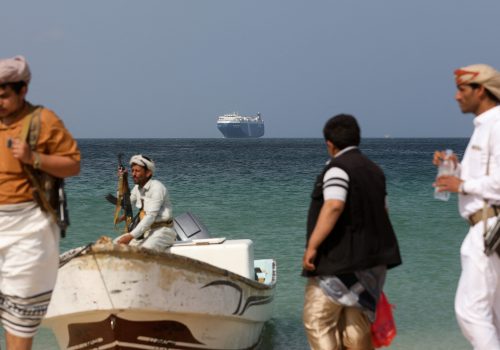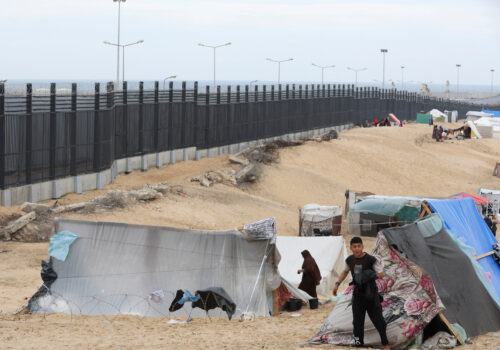The future of Saudi-Israeli relations is a balancing act between Palestinian and regional interests
Before Arab normalization with the state of Israel or the Abraham Accords ever became a reality, any sincere consideration of Saudi-Israel normalization was tied to the prospect of Palestinian statehood. This condition still applies today.
In early 2021, it was clear that the Joe Biden administration sought a normalization agreement between Israel and Saudi Arabia by the end of 2023 as a capstone to the Donald Trump administration’s 2020 Abraham Accords normalization agreements between Israel and the United Arab Emirates (UAE), Bahrain, Morocco, and Sudan. The historic breakthrough of the Abraham Accords, which bolstered Israel’s sovereign right to exist, brought fresh hope for regional stability and economic growth. The heinous attacks by Hamas on October 7, 2023, sought to bury such hope of stability and were launched by those who refuse to accept any terms short of Israel’s destruction. It is the fault of Hamas and its Iranian sponsors that peaceful coexistence is now seemingly further off than ever.
Among the now heightened normalization stakes in 2024, constants remain in the discourse as leaders in Riyadh, Jerusalem, and Washington continue to signal normalization remains on the table. As stakeholders continue to address the war in Gaza, negotiate the release of hostages, advocate for the movement of humanitarian assistance into the Gaza Strip, and seek to mitigate a regional conflagration, there is ongoing strategic consideration of normalization of relations between Saudi Arabia and Israel. Primary constants revolve around the pernicious threats from Iran and its proxies, and persistent interest in Palestinian statehood. Though not a new Saudi position, Palestinian statehood has become amplified during talks of Israeli ceasefires with Hamas and the post-conflict development of Gaza.
SIGN UP FOR THE THIS WEEK IN THE MIDEAST NEWSLETTER
To varying degrees, Saudi officials—including royals—condemned the Hamas attacks on Israel, which required a deliberate Israeli kinetic response. Still, they also recognize that for any reconciliation to take root and normalization to occur, there must be a path toward Palestinian statehood. Before a panel of reporters at the 2024 World Economic Forum in Davos, Switzerland, Princess Reema bint Bandar Al Saud, Saudi ambassador to the United States, noted, “While Saudi Arabia recognizes the need for Israel to feel safe, it cannot be at the expense of the Palestinian people.”
Additionally, during the February 5 visit of US Secretary of State Antony Blinken, as part of his broader Middle East tour to seek de-escalation of regional tensions, his stop in Riyadh included talks with Saudi Crown Prince and Prime Minister Mohammed bin Salman (MBS). The consideration of normalization was among the critical issues discussed regarding the Gaza war and Yemen’s Houthis attacking shipping routes in the Red Sea. Parallel to Blinken’s tour, the release of an annual Arab public opinion survey likely read in Riyadh reported that a current majority of Arabs do not support official recognition of Israel, with 89 percent of respondents from sixteen Arab countries either outright hostile or deeply skeptical of the idea.
Following Secretary Blinken’s fifth regional visit since the war began, the Saudi foreign ministry clarified overtly what had been stated all along in bilateral communications with US officials in the Biden and Trump administrations: “The Kingdom has communicated its firm position to the US administration that there will be no diplomatic relations with Israel unless an independent Palestinian state is recognized on the 1967 border, with east Jerusalem as its capital.”
Secretary Blinken then confirmed Saudi Arabia had conveyed that advancing a two-state solution to solve the Israeli-Palestinian conflict remains a prerequisite for normalization. Still, as his colleagues at the State Department are well aware, the Abraham Accords—which the UAE, Bahrain, Morocco, and Sudan signed in 2020—did not require the condition of regional progress on creating a Palestinian state.
The door for normalization discourse has been wide open since the 2020 Abraham Accords, and the desire remains. However, any credible movement to formalize bilateral relations between Riyadh and Jerusalem cannot ignore what the Saudis have consistently stated about the two-state solution. Looking back at the autumn of 2020, then US Secretary of State Mike Pompeo urged his counterpart, Saudi Foreign Minister Prince Faisal bin Farhan, toward recognition of Israel, stating, “We hope Saudi Arabia will consider normalizing its relationships as well, and we want to thank them for the assistance they’ve had in the success of the Abraham Accords so far.” Pompeo added that he hoped Riyadh would encourage Palestinian leaders, including the Palestinian Authority led by Mahmoud Abbas, to return to negotiations with Israel.
During the 2020 pinnacle of normalization, any US diplomat or official spending time in the Gulf, myself included, was met with sincere expressions of anticipation along with measured pragmatism over the Palestinian file. Fast forward to summer 2023, and the Saudi ambassador to the United States publicly shared the Saudi perspective on Israel-Palestine relations when she noted that Saudi Arabia aims for integration, rather than mere normalization, with Israel. Her remarks highlighted that Israeli-Palestinian peace aligns with Saudi Arabia’s ambitious social reform project, Vision 2030, and that Saudi Arabia envisions “a thriving Israel” alongside “a thriving Palestine.”
The Saudi stance Princess Reema further articulated at Davos, inclusive of Vision 2030, is intended as a comprehensive approach in which prosperity and collaboration transcend the mere coexistence of neighboring states. This declaration, like MBS’s most recent engagement with Secretary Blinken, is an acknowledgment that there is a place in the normalization discourse for Saudi Arabia to use its regional political and economic influence to enable reform of the Palestinian Authority and deradicalize the Gaza Strip and West Bank.
There is also the candid recognition of “statehood” in international affairs that is more consequential than simply recognizing the idea of a state. In treaties and international law, statehood has important sovereign characteristics, including having a defined territory and population and a capital city, and being able to implement government functions. To date, there is not an existent “Palestine” that is both de jure and de facto, in that it exists according to law and practice. If there is to be such a state, it will be incumbent upon existent states, particularly Saudi Arabia, to ensure such a state exists according to both law and practice. Any sort of two-state solution cannot allow for the development of a proto-state permissive to radicalization and terrorist facilitation to exist next to thriving neighboring countries.
R. Clarke Cooper is a nonresident senior fellow with the Atlantic Council’s Scowcroft Middle East Security Initiative and is the founder and president of Guard Hill House, LLC. He previously served as assistant secretary for political-military affairs at the US Department of State.
Further reading
Mon, Dec 11, 2023
Threats from Yemen are increasing. It’s time to redesignate the Houthis.
MENASource By R. Clarke Cooper
Ever since the 2021 lifting of FTO status, the world has witnessed the increased threats emanating from Yemen, which include recent repeated attacks on commercial ships with drones and missiles
Wed, Feb 21, 2024
A steady escalation along the Lebanon-Israel border—and no end in sight
MENASource By Nicholas Blanford
If the Gaza war drags on for much longer and clashes continue to persist along the Lebanon-Israel border, the pressure on the Israeli government to launch some form of offensive into south Lebanon is going to be hard to resist.
Sun, Feb 18, 2024
Regardless of Sisi’s decision on Palestinian refugees in Rafah, he will not emerge as a winner
MENASource By Shahira Amin
Now that Israel has clarified its intent to undertake operations in Rafah, after evacuating the nearly 1.4 million displaced Palestinians who have sought a safe haven in the Gaza Strip’s southern city, it may only be a matter of time before the Egyptian's president's true intentions are revealed.
Image: Handout photo shows Secretary Antony J. Blinken is greeted by MFA DIrector of Protocol Mohammed Al-Ghamdi at King Khalid Airport in Riyadh, Saudi Arabia, February 5, 2024. Blinken met Saudi Arabia's de-facto ruler, Crown Prince Mohammed bin Salman on Monday at the start of a Middle East tour, a U.S. official said, as Washington sought to forge a Saudi normalization deal with Israel. In the Gaza Strip, Palestinians huddling under bombardment said they hoped Blinken's visit to the region would finally deliver a truce, in time to head off a threatened new Israeli assault on the last refuge at the enclave's edge. Official State Department photo by Chuck Kennedy via ABACAPRESS.COM


